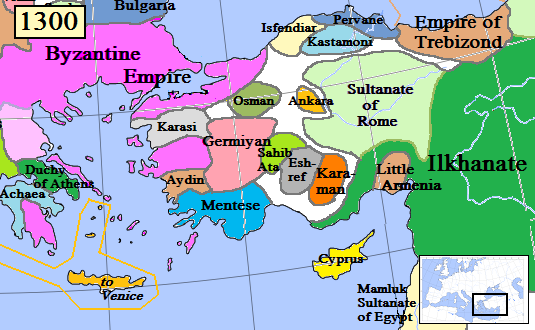|
─░shak Of Karaman
Ishak of Karaman was a bey of the Karamanids, a Turkish principality in Anatolia in the 15th century. He succeeded his father Ibrahim Bey in 1464. His mother was Turkish concubine, who Ibrahim later ordered to kill without Ishak's knowledge. He was the legal heir to throne, and his brothers opposed him. At the time of his father's death, he was a local governor in Silifke. When he tried to march to his capital Konya, he learned that his younger brother Pir Ahmet had put a claim on the throne. This resulted in an interregnum in the beylik. The help of Uzun Hasan, the sultan of Akkoyunlu (White Sheep) Turkmens enabled him to ascend to the throne, albeit for a short reign. Because, Pir Ahmet appealed to Ottoman sultan Mehmet II for help. He offered Mehmet some territory which Ishak refused to cede. With Ottoman help, Pir Ahmet defeated Ishak in the battle of Da─čpazar─▒ Da─čpazar─▒ is a neighbourhood in the municipality and district of Mut, Mersin Province, Turkey. Its popula ... [...More Info...] [...Related Items...] OR: [Wikipedia] [Google] [Baidu] |
Karamanids
The Karamanids ( or ), also known as the Emirate of Karaman and Beylik of Karaman (), was a Turkish people, Turkish Anatolian beyliks, Anatolian beylik (principality) of Salur tribe origin, descended from Oghuz Turks, centered in South-Central Anatolia around the present-day Karaman Province. From the mid 14th century until its fall in 1487, the Karamanid dynasty was one of the most powerful beyliks in Anatolia. states and territories disestablished in the 1480s History The Karamanids traced their ancestry from Hodja Sad al-Din and his son Nure Sofi, Nure Sufi Bey, who emigrated from Arran (Caucasus), Arran (roughly encompassing modern-day Azerbaijan) to Sivas because of The Mongol Invasions, the Mongol invasion in 1230. The Karamanids were members of the Salur tribe of Oghuz Turks. According to others, they were members of the Afshar tribe,Cahen, Claude, ''Pre-Ottoman Turkey: A General Survey of the Material and Spiritual Culture and History c. 1071ÔÇô1330'', trans. J. Jone ... [...More Info...] [...Related Items...] OR: [Wikipedia] [Google] [Baidu] |
